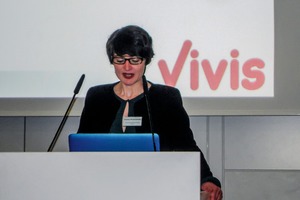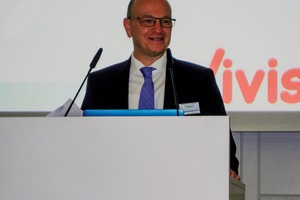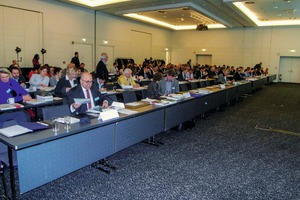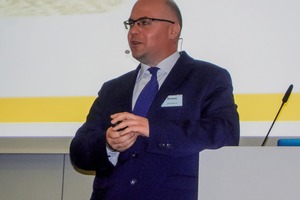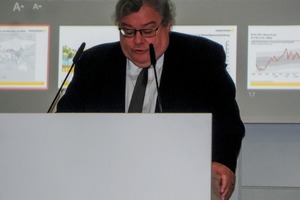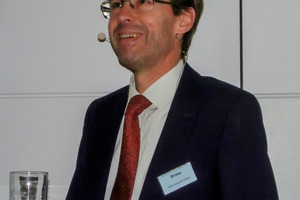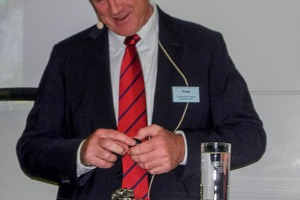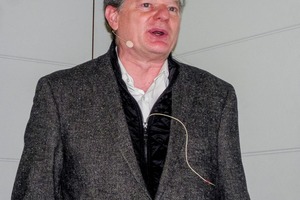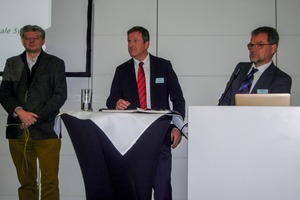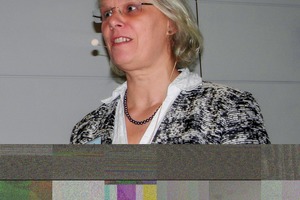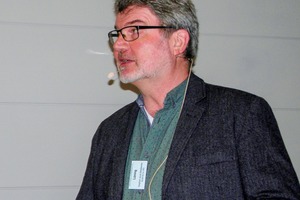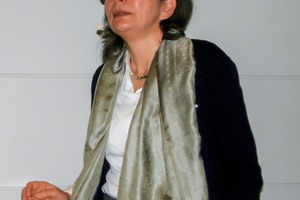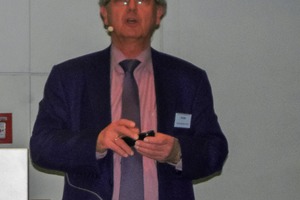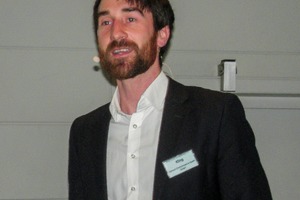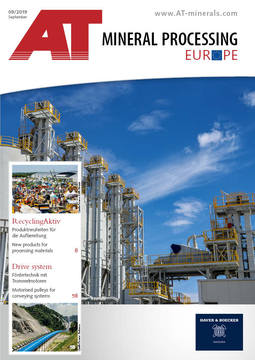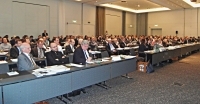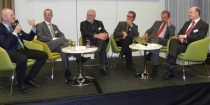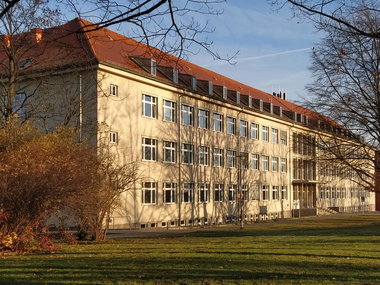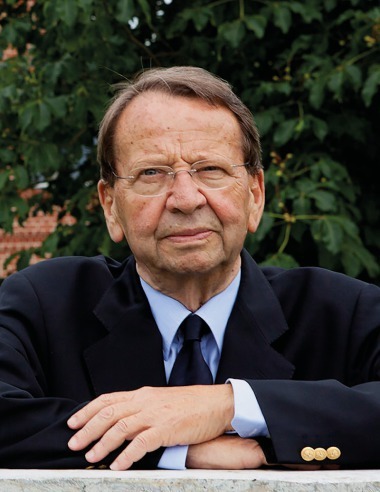Berlin Recycling and Commodity Conference 2019
The conference was opened by Elisabeth Thomé-Kozmiensky M.Sc., CEO of Thomé-Kozmiensky Verlag GmbH, Neuruppin, who drew attention to talks (“B2B meeting”) taking place in parallel to the conference with an Iranian delegation from the waste-management sector and concerning the promotion of knowledge transfer and business cooperation. The attendees also had the opportunity during the two days of the conference to obtain free-of-change information and advice on the possibilities of funding by the federal government. A student workshop was also held in the afternoon, during the plenary session.
In his introductory address to the event, Prof. Dr.-Ing. Daniel Goldmann, of Clausthal University of Technology, expressed his pleasure that scientific leadership of the conference is now to be strengthened by Prof. Dr.-Ing. Dr. h. c. Bernd Friedrich, of the RWTH Aachen University. Together, the team intends, in the future, too, to further develop and refine the legacy of Prof. Dr.-Ing. habil. Dr. h. c. Karl Thomé-Kozmiensky. The panel discussion has now been abandoned, in order to allow more speakers to address the audience. Dr.-Ing. Stephanie Thiel and Dr.-Ing. Olaf Holm, both of Thomé-Kozmiensky Verlag GmbH, Neuruppin, were responsible for program coordination.
Plenary session: Resources policy, strategy and legislation
The fourteen plenary papers on the first day of the conference covered a broad spectrum and spanned the stated topics without it being possible, this year, again, to examine radical reorientations or new legal provisions. The points discussed on global markets, European resources strategy and the digitalisation of the circular economy nonetheless provided new knowledge and perceptions of importance for understanding resources and recycling policy in Germany.
Eugen Weinberg, Commerzbank AG, Frankfurt/Main, thus examined, in “Resources markets in the thrall of economic, monetary and geopolitics”, developments on the world market. Resources markets are becoming ever more heavily influenced by economic, financial and geopolitics. This speaker devoted particular attention to China, which does not see itself as a market player but intends, instead, to go its own way. Weinberg forecasts that China will, in future, concentrate less on the production and export of resources and, instead, on technologies, in order to obtain the status of an industrialised state. For this, China needs brains and buys them in. One problem, however, is that China is very heavily in debt. During the discussion, the depiction of China was considered to be over-positive and there were calls to focus more on Germany, since Germany has much greater problems. Due to rising prices, trade restrictions, etc., the recycling industry will increasingly gain in importance – this was the unanimous opinion. This was also expressed by Reinhard Bütikofer, Member of the European Parliament, Brussels, in his paper entitled “The EU as a recycling strategist”. He presented the EU‘s projects for the coming years, taking account of new global economic conditions and reminded the audience of the agreements already made for a European circular / recycling economy, including, for example, the successful conclusion in December 2018 of negotiations for the reduction of plastic packaging, all of which is to be produced in recyclable form by 2030. Here, again, there was a critical discussion on the handling of the cost of recycling, which can in no way be ameliorated in the long term by means of subsidies.
China was also the topic selected by Attorney Dr. Ulrich Teich, of the SCHINDHELM Schmidt Rogge Thoma firm of attorneys, Düsseldorf, who devoted his address to the “Challenges for the secondary resources market in the field of plastics between Chinese trade restrictions and the EU‘s plastics strategy”. He described the Chinese waste-management industry (a Circular Economy Act was enacted in 2009) and outlined the discrepancies between legal regulations and the actual handling of waste. His conclusion: China is an interesting market for German and European companies, in all sectors of the disposal industry and the circular economy. Chinese companies, he noted, are currently setting up in Germany in order, for example, to produce plastics recyclates for China. German companies would be well advised to cooperate with such companies. Dr. Thiel also recommends such a cooperation with Chinese companies in the field of landfill mining in China.
A number of papers were indeed not uninteresting, but also disclosed no significant new facts. This was the case, for example, with the overview address by Prof. Dr. Bettina Rechenberg, of the German Environmental Agency, Dessau, on the handling of life-expired electrical equipment. It was notable, however, that not only the recovery of useful materials, but also the elimination of pollutants, was mentioned as an important task of the circular economy. The extent to which a plenary-session paper on the obtainment of federal research funding (Senior Government Officer Dr. rer. nat. Helmut Löwe, Federal Ministry of Education and Research, Bonn: “Resources-efficient circular economy”) is really appropriate is at least worthy of consideration, since advice on this subject was already on offer outside of the auditorium papers. The address of University Professor. Dr. mont. Roland Plomberger, of the University of Leoben, Leoben/Austria, which examined the questions of what employment-related effects the optimised treatment of residual waste would entail, can be also be assigned to this category. Extremely plausible: the more differentiated the waste-management system, the more labour will be needed.
The legal part of the plenary session initially discussed the implementation of the Packaging Act. Attorney Prof. Hartmut Gassner, of the Gassner, Groth, Siederer & Coll. Partnerschaft von RAe mbH firm of attorneys, Berlin, examined, after a short historical outline extending from the enactment of the Packaging Regulations (VerpV.; 1991) up to the coming into effect of the Packaging Act in early 2019, the complexity of the Act, complete with all its coordination declarations between public-law disposal obligations and system operators, the procedures in the case of the lightweight packaging and the paper, card and cardboard fractions, and the many anomalies with respect to securities, inter alia. “The Packaging Act is not ideal, it is a law of compromises. The disposal of packaging is, however, associated with a high symbolic value that extends well beyond its significance for the waste-management industry and the national economy,” Prof. Gassner concluded.
As Peter Kurth, managing president of the BDE, Berlin, outlined, there still remain even today significant deficits in the implementation of the amended Commercial Waste Regulations (GewAbfV), enacted as long ago as 1 August 2017, particularly with regard to enforcement. The Enforcement Notes (LAGA M 34), for example, are even now not finished. This speaker mentioned as positive features the expansion of separate collection, the greater inclusion of recycling and the focus on the generators of waste. Negative, on the other hand, were the lack of attention to the markets for the recyclates, the “rate fixation”, i.e. excessively high recycling rates – a rate of 30 %, he opined, in the reminder in the case of separate collection, and furthermore, universal monitoring would scarcely be achievable, given a total of some 3.23 million waste generators, without financial assistance (labour) for the municipalities. For this reason, the BDE has itself already formulated a number of demands for the review of the amendment mandatory after three years.
The effects of the calculation method described in the new Waste Framework Directive 2018/851 dated May 2018 on the attainment of the recycling rates specified for residential waste were comparatively analysed for Germany, Austria and Switzerland by Thomas Obermeier, of TOMM+C Management & Consulting, Berlin. His extensive calculations demonstrated that none of these countries now continue to achieve rates of > 50 % (Germany up to now 67.6 %) and that the specified targets (2025: 55 %) have not yet been reached. The extent to which questions of definition (basic totality of residential waste, recycling rates) will also continue to influence the calculations remains to be seen.
The closing complex of the plenary event was made up of three papers on digitalisation in the recycling industry from greatly differing perspectives. Parallels between the energy and the resources turnaround were outlined by Minister of State (ret.) Eveline Lemke, of Sustainability and Circular Economy Consulting, Niederzissen, who focused here on the importance of new business models, digitalisation and small and medium-sized enterprises. Her credo: “What we need is not efficiency, but effectiveness”, underpinning this with a number of examples, including, inter alia, so-called laser de-inking. In this process, developed in Israel, the printing ink is detached at the consumer‘s from the paper, which can then be immediately reused.
Ralf Mittermayr, Saubermacher Dienstleistungs AG, Feldkirchen/Austria, focused on the objective of improving the separate collection of waste in Austria via the use of ultra-modern technology. The background to this was that only 25 to 30 % of non-recyclable waste lands in the residual-waste bin, the far greater portion being recyclables. New technologies, such as the recyclables scanner and the smart waste bin have been developed in order to ameliorate this situation. The speaker described the functioning and initial, positive, results of their use in two municipalities in Styria since August 2018. Quality of separation has improved significantly, and the non-recyclable waste content has risen to 70 %.
Finally, Prof. Dr.-Ing. Daniel Goldman, of Clausthal University of Technology, elaborated in his overview paper entitled “Recycling 4.0 – On the road to the digitalisation of the circular economy”, how digitalisation, effective provision of information and the networking of the various players can make it possible to successfully tackle and solve future problems with the circular economy. Increasingly more complex products, he noted, necessitate an efficient and holistic control of recycling / valorisation systems, which, however, does not yet exist. Prof. Goldmann cited various examples of how digitalisation is succeeding even today and how it is becoming possible to estimate which fractions or materials are to be recycled or further valorised. A showcase example of this is the automotive production segment, which the speaker examined as a case in point.
Specialist sessions
The attendees were offered on the second day of the conference an interesting scientific program, subdivided into four sections and featuring more than forty specialist papers, these being chronologically coordinated with each other in such a way that it was possible to switch between the different sections. The prime focuses here were on:
Plastics
Metals
Electrical / electronic equipment / electromobility / vehicles / batteries
Reuse / service-life prolongation of products
r+ Impulse projects
The scope of this report does not permit detailed examination of all these papers. A small selection of technically oriented papers on selected focal topics and their authors are examined in brief below by way of example.
Plastics
There seems to be no end to the disaster reports concerning the pollution of the world‘s oceans with plastic waste. The subject of “Plastics in the environment” thus played, as expected, an important role in this section. This series of addresses was kicked off, however, with an overview paper by Dipl.-Wirtsch.-Ing. Christoph Lindner, of Conversio Market & Strategy GmbH, Mainaschaff, on the subject of “The status of production, processing and recycling of plastics in Germany”, which delivered a plethora of data.
Then came “Plastics in the environment: Micro- and macro-plastic – Sources, quantities, distribution, effects, and conceptual solutions”, a paper by Dipl.-Ing. Jürgen Bertling, of the Fraunhofer Institute UMSICHT, in Oberhausen. The current scientific status was approximately outlined on the basis of the quantification of macro- and micro-plastics in the environment, and the basic principles of a solution strategy then presented on this basis.
Two other addresses focused on measures and solutions for the pollution of the oceans with plastics (Stefanie Werner, German Environmental Agency, Dessau-Rosslau) and the harmonisation of analysis procedures of such waste (Dr. rer. nat. Ulrike Braun, Federal Institute for Materials Research and Testing, Berlin).
Still a topical subject: the recycling of plastics, also a field of heated discussion among specialists. The title of the paper presented by Prof. Dr. Rainer Bunge, of the Rapperswil University of Applied Sciences, Switzerland, thus has almost a provocative tenor: “Plastics recycling is not worthwhile”. In Switzerland plastic waste is very largely thermally valorised. The environmental authorities have, for this reason, come under pressure and have commissioned a study which was intended to establish the ecological benefit and the costs of materials-route recycling of plastics. The study demonstrated that the collection of post-consumer packaging achieves only a marginal ecological benefit, against unacceptably high costs. Prof. Bunge cited extensive analyses and the evaluation of much data to conclude that plastics recycling is not only inefficient but also of little ecological effectiveness. Effectiveness also falls additionally if – as widely practised in the EU – mixed plastics are exported to threshold countries. In view of these results, the Swiss environmental authority saw no reason to introduce by law the collection of plastics (stipulation of quotas). The collection of monofractions, such as PET, for instance, is supported, on the other hand, by private industries (retail trade).
Dr. rer. nat. habil. Thomas Probst, of the Federal Association for Secondary Raw Materials and Disposal, Bonn, viewed this subject complex totally differently, and gave a corresponding response: “Plastics recycling is worthwhile!“. He did, indeed, thoroughly support the Swiss system, but asserted in his opening remarks that the previous speaker had judged the German system too severely. Similarly to Prof. Bunge‘s procedure, Dr. Probst examined both the economic and ecological aspects, under the new market conditions, in particular. This speaker came to the conclusion that, in Germany, in the view of plastics recyclers, only materials-route valorisation constituted a positive recovery of value. Some 2.87 million t of plastics waste (46.7 %) were materials-route recycled in Germany in 2017. The 1.87 million of recyclates recovered achieve net prices of 550 to 1,380 €/t. Incineration of plastics waste would, at current prices of 120 to 170 €/t in WIPs, give raise to significant additional costs for the country‘s citizens.
As was to be expected, a lively discussion then arose, focusing, on the one hand, on the high costs of separate collection with all its problems, such as space requirements for provision, high missorting rates and significantly lower proceeds for recyclates than claimed and, on the other hand, the estimation of the ecological benefit and the problems of littering.
Further topics in this section included, inter alia, the effects of new prohibitions on the use of flame-retardants in plastics on the recycling of life-expired vehicles (Dr.-Ing. Georg F. Mehlhart, Oeko-Institute, Darmstadt) and separation technologies for black plastics (Dipl.-Ing. Andreas P. Wunsch, hamos GmbH Recycling- und Separationstechnik, Hameln).
Metals
The ten papers in this sector discussed a broad range of materials and processes. In the case of metals, too, multi-component systems have long played an important role, and their recycling thus presents a challenge similar to that of other mixtures of material. This was impressively illustrated by Dr.-Ing. Elinor Rombach, of the RWTH Aachen University, in her address entitled: “Innovative polymetal recycling – Challenges and conceptual solutions”. She emphasised the special ranking of those metals which are, for practical purposes, “eternally” recyclable, but also demonstrated that, as a result of miniaturisation and composite metal materials, the cost:benefit ratio can become unfavourable. The aim is, indeed, to recover closed waste-free production cycles, but this, in reality, does not work (pollutants sink). In secondary raw materials, the “tramp” elements are in many cases more numerous than in primary raw materials, i.e. the bandwidth of metals increases, in electronic waste, in particular. In the conventional recycling process, the majority of these metals are lost, but these are in many cases precisely those that make up the value content. The problems of disruptive elements such as carbon, bromine, chlorine, fluorine, sodium and sulphur and their negative effects on pyrometallurgical and hydrometallurgical processes were also illuminated, as was their exclusion (polymetal recycling in recycling cascades).
The recycling of Ni/Co-based superalloy scrap (“Processing and quality assurance on the road back to a high-tech metal”) was debated in the address by Dr. Joachim Lüning, of Siegfried Jacob Metallwerke GmbH & Co. KG, in Ennepetal. Following a brief historical outline of the development of superalloys and a description of the recycling circuit, featuring recycled, production and life-expired scrap, this speaker examined in more detail the sophisticated analytical procedures which are necessary for the recovery of top-quality recycled material. Appropriate scrap processing, he noted, produces high-quality scrap which can then be further processed in a vacuum furnace to a superalloy which is also suitable for the production of critical components (aircraft engines). Dr. Lüning asserted that alternative pyrometallurgical and hydrometallurgical routes will be a vital necessity in order to permit in future the pure-fraction recycling of ever more complex components complete with their coatings and co-composites and to prevent non-functional downcycling.
Papers on the sorting of scrap occupied an important portion of the session. Dr. Claudius Laska, of Hydro Aluminium Rolled Products GmbH, Bonn, for example, discussed “LIBS–based sorting as a solution for automotive scrap”. Sensor-supported sorting (Dipl.-Ing. Martin Geisler, of Cronimet Ferroleg. GmbH, Karlsruhe) and eddy-current sorting technology (Dipl.-Ing. Georg Dorninger, IFE Aufbereitungstechnik GmbH, Waidhofen) were also discussed, however. Still a topical subject, and one with potential for optimisation: the recovery of zinc from steel-plant dusts, and the presentation of a process for de-oiling of cooling-lubricant-contaminated metal swarf and sludges, to mention only a few.
Electrical and electronic equipment/electromobility/vehicles/batteries
Of the eleven papers in this series, which were also orientated around sustainability and digitalisation of the circular economy, three in particular should be mentioned.
Dr. Siegfried Kreibe, of bifa Umweltinstitut GmbH, Augsburg, spoke on the recovery of noble and special metals, a field to which many research projects have already been devoted, but the implementation of the results of which has generally failed due to the associated economic challenges. The paper described the ILESA (smart control of waste flows containing noble and special metals: merging, temporary storage, recovery, efficiency) joint project in which numerous waste flows containing noble and special metals were analysed on behalf of the German Environment Agency. The aim here was that of identifying provisions by means of which the recovery of such metals could be improved or even actually made possible. Citing examples of SE-containing magnet materials and motor-vehicle components containing noble metals, the speaker demonstrated how specific options can boost and optimise recycling rates. These provisions should, he noted, be applied only commensurately and appropriately to the ecological benefits. Complex legislative provisional appear at present not to be rational.
The results of a study into the implementation of the WWE2 directive (RL 2012/19EU for the management of WEEE [waste electrical and electronic equipment]) conducted on behalf of the European Commission in 2016/2017 were presented by Maximilian Kling, of Ramboll Environment & Health GmbH, Munich. The study‘s target was the reviewing of the technical content of this directive and evaluation of the extent to which the member states are in a position to implement it. In addition, exchange of information on the practices deployed in the management of WWE was to be made possible and promoted, and current collection and treatment improved. A whole series of recommendations for improvement of WEEE was also derived for the EU Commission and for the individual member states.
Lithium, thanks to its properties, remains a key component for Li-ion batteries, and interest in the recycling of life-expired batteries remains constant, despite the difficulties involved in processing, since, according to market research, demand for Li could double or even triple by 2025. Even last year, the recycling of such batteries provided an important topic at the Berlin conference. This year, conference participants were presented from the mouths of proven experts with the continuing development achieved by REDUX Recycling GmbH, of Offenbach, in the address by Dipl.-Ing. Holger Kuhlmann, the CEO of this company. Since 2011, this, Europe‘s leading battery-recycling company (market share 40 %), has been making great efforts for the development of a process and the construction of a plant for the recycling of Li-ion batteries, a project now successfully completed. This ultra-modern, innovative facility, designed for 10 000 t/a, has been operating at a throughput of 5 t/h since June 2018. The speaker explained it in detail and also spoke of the necessary high safety standards (high energy contents and high energy density in the life-expired batteries) and of the conditions imposed on the company for this difficult recycling process. In conclusion, he discussed the first full-service return system for Li-ion batteries – SIMPLiRETURN – a Joint Venture between Interseroh and Austria‘s Saubermacher Dienstleistungs AG.
r+Impuls projects
Six papers focused on projects, the aim of which is the development of innovative industrial processes up to market maturity and their use to reduce the consumption of resources in the production process directly, or indirectly by means of recycling used materials.
Examples include:
EZiRec – Effective recycling of tin from PCB-production waste products (Dr. Nils Schirmer, TIB Chemicals AG, Mannheim) or
Noble-metal adsorber – Recovery of noble metals from residue-flows in the metals-using industry by means of fibre-fixed adsorbers (Dr. Klaus Opwis, Deutsches Textilforschungszentrum Nordwest gGmbH, Krefeld)
Reuse/extended use of products
In the Circular Economy Act (KrWG), the legislator has, it is true, already assigned a high ranking in his waste-avoidance strategy to the reuse of waste in the waste hierarchy, with its ranking second in the “table”, but implementation continues to leave many possibilities open. The fact that ever more attention is being devoted to these problems is illustrated in the form of the special small section organised in Berlin for this purpose.
Dipl.-Ing. Thomas Holberg, of TES-AMM Central Europe GmbH, Recklinghausen, for example, spoke on the second-hand market for electronic (IT) equipment, this subject being all the more interesting against the background of a forecast of an increase in global electronics-scrap yields to above 50 million t by 2021 as a result of consumer behaviour. Around 80 % of the current yield is handled without controls and, in many cases, simply exported to threshold and developing countries. In his comprehensive overview paper, the author discussed placing use above recycling, value creation via sale, longer useful service within IT companies, the overhaul and/or repair of equipment (refurbishing), reuse and the global second-hand trade, with the inclusion of ITAD companies (IT asset disposition, service-providers for the return of life-expired IT equipment).
Christian Dworak, of BSH Hausgeräte, Munich, reported on “Preparation for reuse, taking the example of electrical and electronic equipment”, while Sybille Meyer, of Fair Cup UG, Göttingen, presented a versatile deposit/reuse system, known as FairCup.
Concluding remarks
The 12th Berlin Recycling and Commodity Conference was able to continue the successful series of this event. Thomé Verlag GmbH accomplished the organisation of this, Germany‘s largest recycling event, with great commitment and professionality. Interest in the event remains undiminished. Yet again, excellent speakers were booked and a plethora of interesting topics – both research projects, scientific investigations and industrial applications – were discussed, particularly during the specialist section on the second day of the conference. In view of the fact that there were no fundamental new legal provisions needing discussion, this year‘s omission of the panel discussion was fully appropriate. If the umbrella regulations are actually passed this year, there will certainly be sufficient matter for discussion again next year. How much still needs to be done in order to realise Circular Economy 4.0 in Germany was stated several times, and also critically discussed. The event clearly showed that much is happening in Germany in the recycling sector, that efforts are being undertaken to transfer research results to industry, but that economic constraints and only slight ecological benefits often present hindrances.
The majority of the papers are included in “Recycling und Rohstoffe” Volume 12, ISBN 978 –3-944 310-46-6, Thomé-Kozmiensky Verlag GmbH, Neuruppin 2019 or can be viewed via //www.vivis.de/fachbuecher/recycling-und-rohstoffe/464-recycling-und-rohstoffe-band-12" target="_blank" >www.vivis.de/fachbuecher/recycling-und-rohstoffe/464-recycling-und-rohstoffe-band-12:http://www.vivis.de/fachbuecher/recycling-und-rohstoffe/464-recycling-und-rohstoffe-band-12. The next Berlin Recycling and Commodity Conference will be held on 2 and 3 March 2020.

